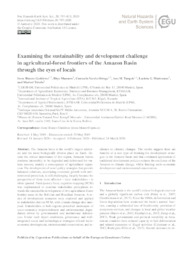Examining the sustainability and development challenge in agricultural-forest frontiers of the Amazon Basin through the eyes of locals.
Examining the sustainability and development challenge in agricultural-forest frontiers of the Amazon Basin through the eyes of locals.
Author(s): BLANCO-GUTIÉRREZ, I.; MANNERS, R.; VARELA-ORTEGA, C.; TARQUIS, A. M.; MARTORANO, L. G.; TOLEDO, M.
Summary: The Amazon basin is the world's largest rainforest and the most biologically diverse place on Earth. Despite the critical importance of this region, Amazon forests continue inexorably to be degraded and deforested for various reasons, mainly a consequence of agricultural expansion. The development of novel policy strategies that provide balanced solutions, associating economic growth with environmental protection, is still challenging, largely because the perspective of those most affected - local stakeholders - is often ignored. Participatory fuzzy cognitive mapping (FCM) was implemented to examine stakeholder perceptions towards the sustainable development of two agricultural-forest frontier areas in the Bolivian and Brazilian Amazon. A series of development scenarios were explored and applied to stakeholder-derived FCM, with climate change also analysed. Stakeholders in both regions perceived landscapes of socio-economic impoverishment and environmental degradation driven by governmental and institutional deficiencies. Under such abject conditions, governance and well-integrated social and technological strategies offered socio-economic development, environmental conservation, and resilience to climatic changes. The results suggest there are benefits of a new type of thinking for development strategies in the Amazon basin and that continued application of traditional development policies reduces the resilience of the Amazon to climate change, whilst limiting socio-economic development and environmental conservation.
Publication year: 2020
Types of publication: Journal article
Unit: Embrapa Eastern Amazon
Observation
Some of Embrapa's publications are published as ePub files. To read them, use or download one of the following free software options to your computer or mobile device. Android: Google Play Books; IOS: iBooks; Windows and Linux: Calibre.
Access other publications
Access the Agricultural Research Database (BDPA) to consult Embrapa's full library collection and records.
Visit Embrapa Bookstore to purchase books and other publications sold by Embrapa.

